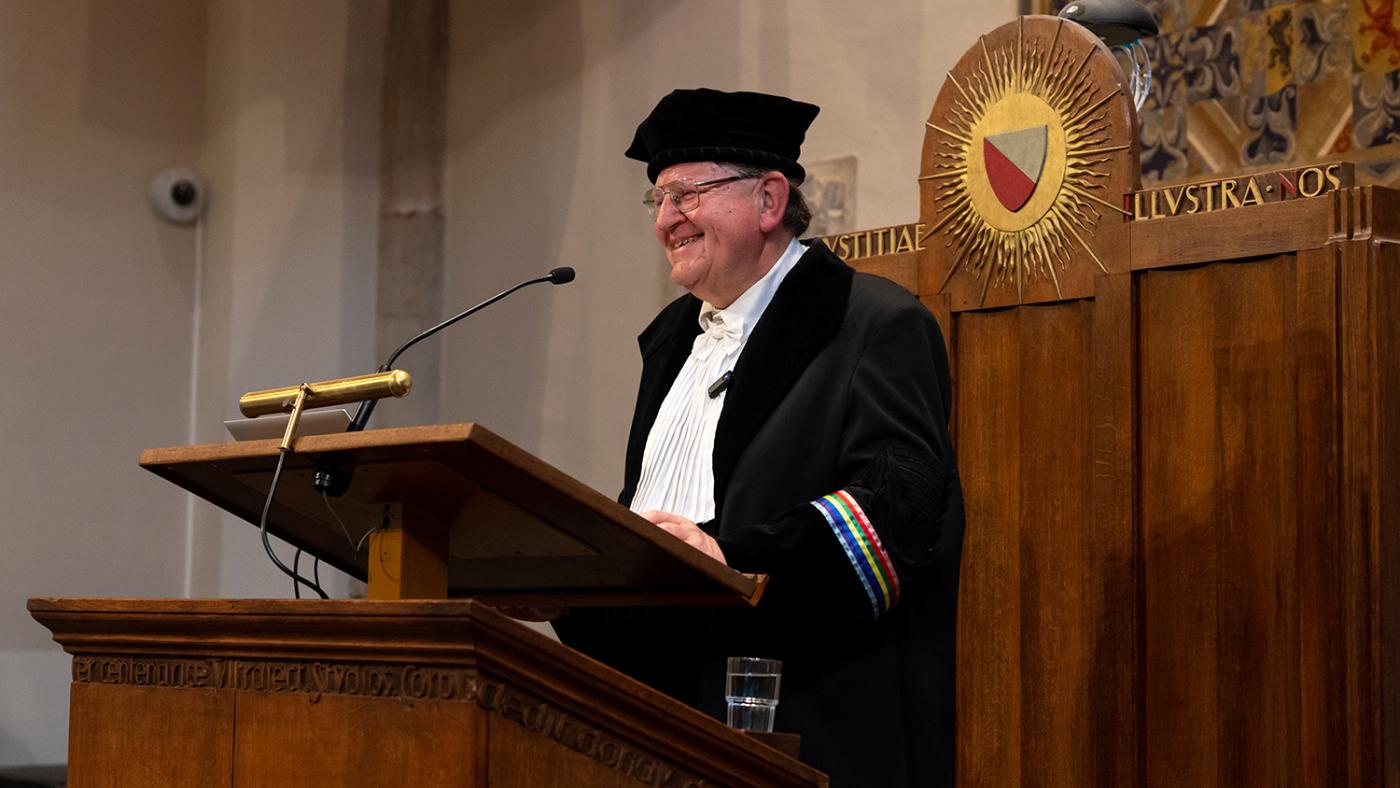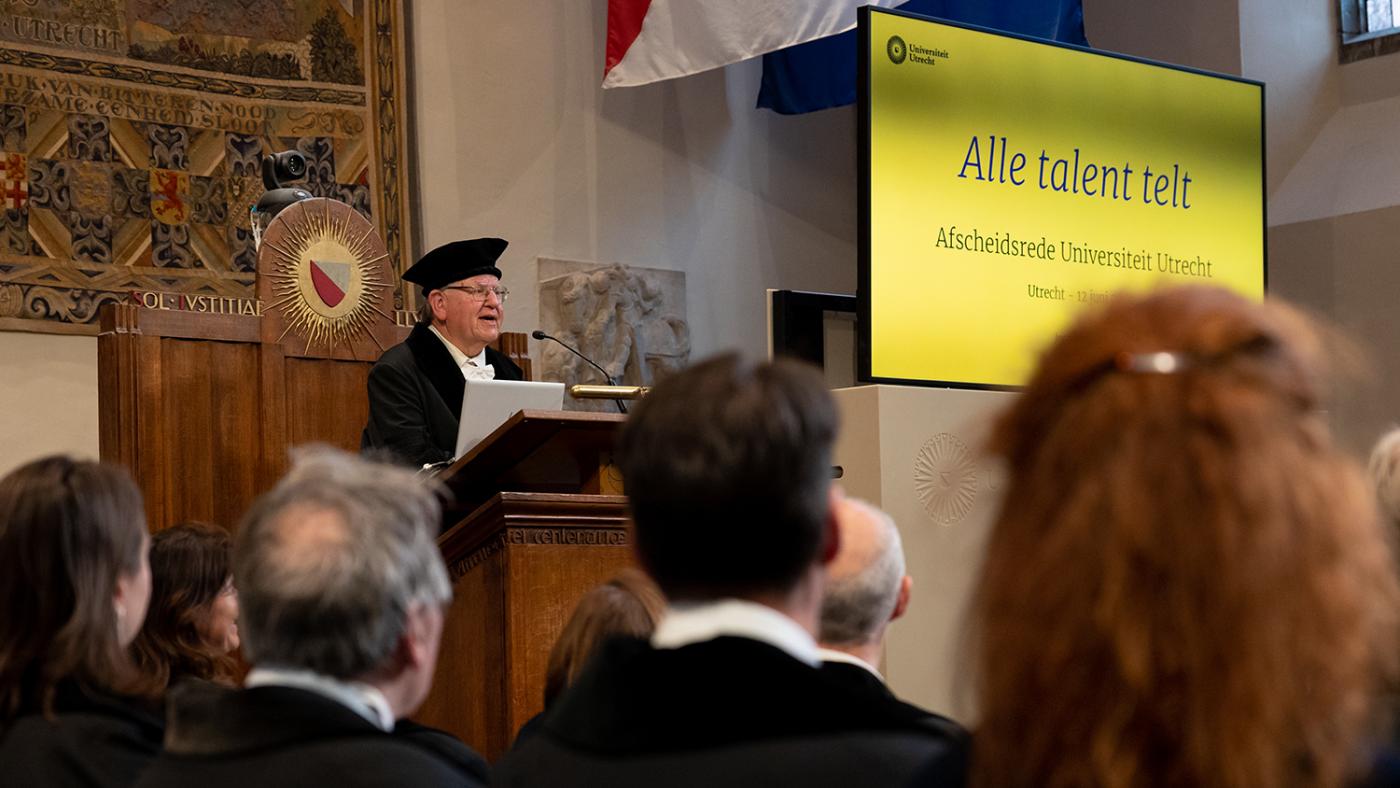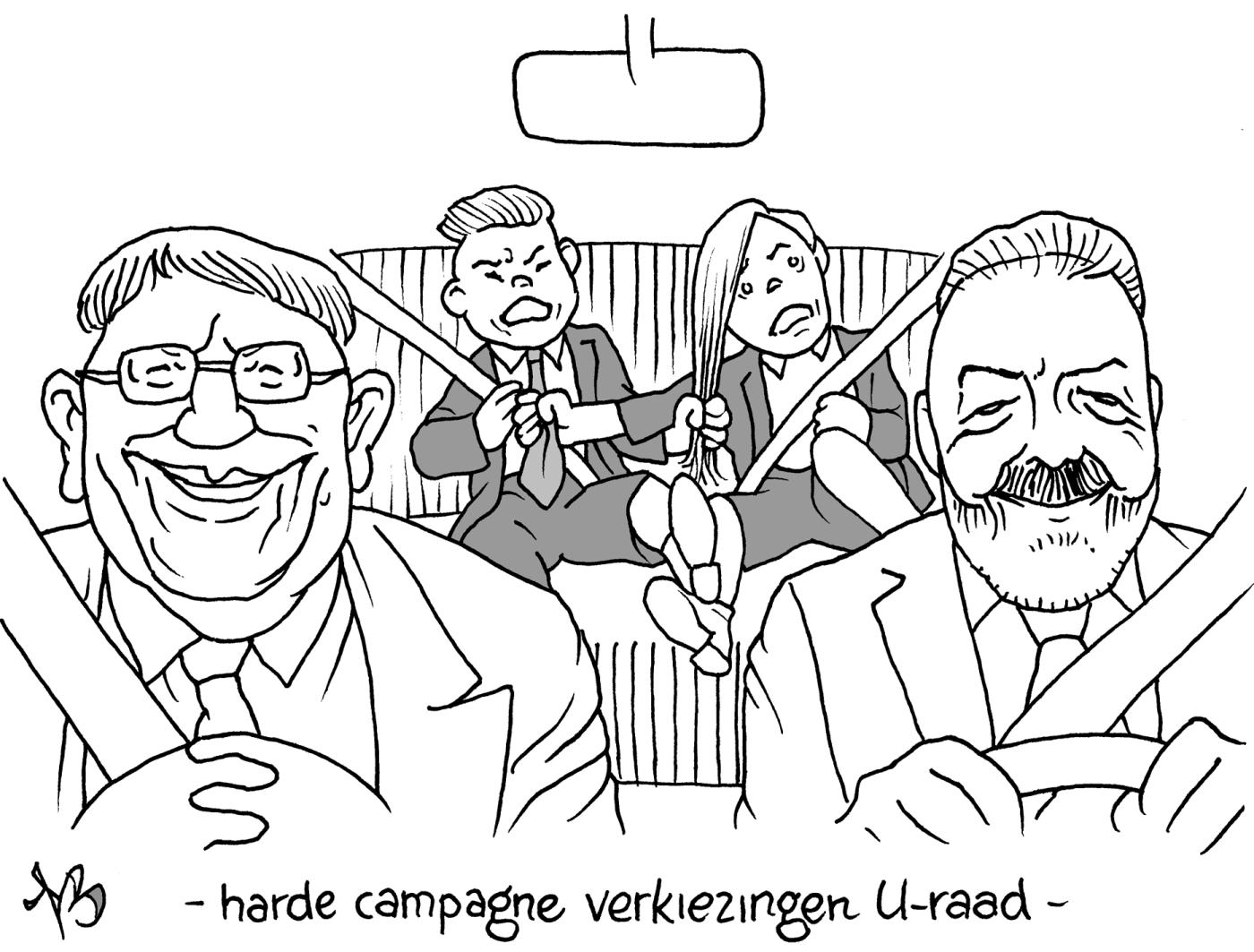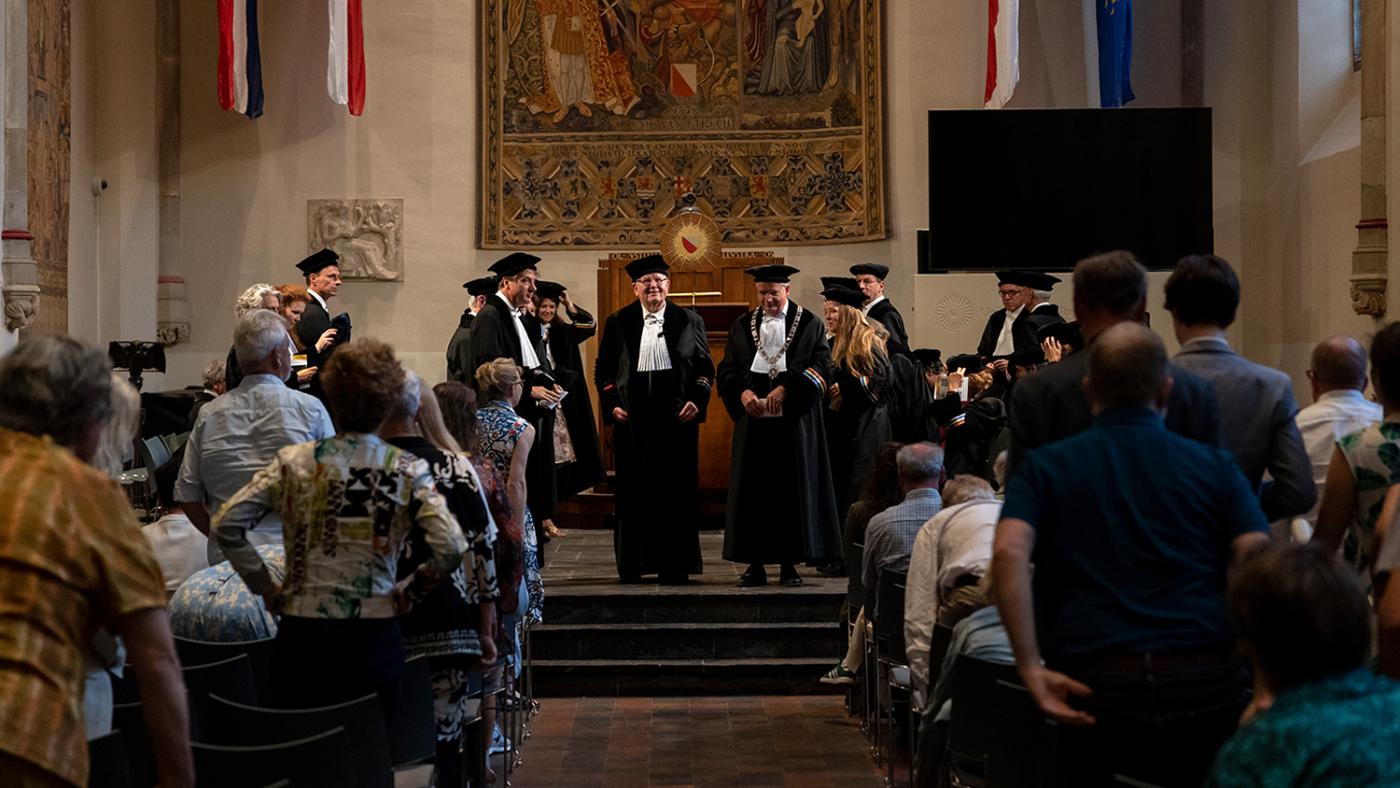Also known as ‘Mr. University Council’ and ‘Dr. Clavan’, Joop Schippers is forced into retirement
‘Let's put an end to the automatism of everyone having to retire at the age of 67’

If there is one thing you can't say about Joop Schippers, it is that he has been idle over the past 47 years. Trained as an economist at Erasmus University, the Rotterdam native started his career in Utrecht in 1978 as a student assistant. His farewell lecture as professor of labour economics took place in early June at a packed Utrecht University Hall.
Always on the go in a suit and a briefcase in hand, Schippers is broad-shouldered but seems always relaxed. Over the years, he became a familiar figure to many people in the UU community. He also built up a large network outside the university.
Schippers was – and still is – a welcome guest on radio shows and podcasts where he is invited to explain labour market trends, such as ageing, staff shortages and hybrid working.
In 2013, he won the first UU Publi Prize for his ability to translate scientific insights to a wider audience. “I've become a bit like the go-to media guy to talk about gender pay gaps,” he says in his farewell interview with DUB.
For many years, he was also active in employee participation at the faculty and university levels. As the chair of the staff section, in the sixteen years that he became the face of the Utrecht University Council, he was appreciated – and occasionally criticised – for how he used his undeniable verbal and social skills to articulate compromises with the executive board.
Upon reaching retirement age in 2022, Utrecht University awarded him the Silver Medal of Honour, inscribed with the words “Joop Schippers – critical and loyal, with a passion for participation and science”.
He does not consider this a real break with Utrecht University, even after his farewell lecture. Schippers will continue to conduct research and contribute to the committees of which he is a member. He also still has several PhD students under his wing. “As a professor, the transition from working life is less abrupt than for many others. I consider that a privilege.”

Photo: Tara van den Broek
'Not everyone is burnt out and tired of working'
"I would have liked to continue for a while longer. I reached retirement age two years ago. At my request, I was granted an extension, which ended on the first of January. It's a pity, but the biggest difference between then and now is that I am no longer employed by the university; otherwise, much of my work will stay the same.
I have long advocated that we should take a more differentiated approach to the state pension age. I don't think it makes much sense that everyone has to leave at 67 because they have reached a certain age. Not everyone is tired of working and burnt out.
As a society, we are doing ourselves a disservice, especially given the tight labour market, if we do not make use of skilled people who still have the energy to contribute. I see many people in their seventies and eighties around me who are still very sprightly and energetic.
Universities should also consider this. For example, it is often difficult to find a second thesis supervisor. If you asked lecturers to review a few theses a year after they retire, some of them would certainly be willing to do so.
Why don't we have a conversation a few years before employees are supposed to retire about what they would still like to do and what they are still capable of doing? If you want to close the door behind you and go sailing on your boat, that's perfectly fine. But if you still want to do something and are still capable of doing it, then that should also be possible. In my opinion, a more flexible approach is in line with the mature labour relations we strive for as a society.
I am very aware, however, that as an emeritus professor, I am in a very privileged position. I have a decent hospitality agreement. I remain involved in the “More hours work” project, which is funded by the National Growth Fund. I sit on a number of committees of the National Coordination Committee for Education Research. I still have five PhD students, some of whom have just started. And recently I was asked to be the “figurehead” – that's really what they call it there – of the National Science Agenda route Resilient Societies. For the time being, I'm only retiring at 10 a.m., because I now have the luxury of being able to schedule my appointments a little later."
'I am one of the few who have kept the flame of emancipation policy burning'
"If you ask me what I am proud of, it is that I am one of the few scientists in the Netherlands who has kept the focus on emancipation policy alive.
I come from a family with a traditional division of roles. My father worked at an office, and my mother was a stay-at-home mom. She was no less intelligent; she simply had less education. Sitting at home and not using your talents is something we no longer know. In that sense, progress has been made. But there is still a lot to be gained.
Yet, twenty years ago, Minister Aart Jan De Geus (former minister of Health, Welfare and Sport, Ed.) said that the emancipation process was more or less complete. The Emancipation Council I was a member of had already been disbanded at that point. Many colleagues in academia also shifted their interest to other areas of research, but I kept the flame burning.
My thesis, written in 1987, was already about pay differences between men and women. These have narrowed over the years, but they have certainly not disappeared. I am also still on a committee that monitors whether women at the top of the business world are given enough opportunities. You could also look at academia, where only 25 percent of professors are women. There is no good reason for this. Just as many women study as men.
Eight years ago, together with several colleagues, I wrote a book about Dutch emancipation policy. I think that book deserves an update; that's another item on my to-do list for the next few years."
'It makes no sense for the UU Council to ruin its relationship with the Executive Board'
"When I first joined the University Council, things were a little bit tense. People were upset about documents arriving late, and there was a lot of grumbling. That has changed considerably. Employee participation has become more constructive and mature.
The focus has shifted towards content, which I'm happy about. Good administrators recognise serious arguments. If you want to get things done, you must react to them. On the whole, I've always been able to work with good administrators in Utrecht. Some were better than others, but in general, they understood what participation requires.
Some people may have found me too soft as a council member, and that may be true. Employee participation often gets that criticism. People say things like, ‘You’re just buttering them up and letting them get away with too much.’ But let me put it this way: the Amsterdam approach of ‘going in hard’ has never been my style, and I’m glad that few of my fellow council members in Utrecht had that attitude.
In my opinion, the council and the board have a joint mission and responsibility: together, they must ensure that the university functions as well as possible. There is no point in destroying relationships or, so to speak, attacking the opponent instead of attacking the ball. Sometimes you must give something to get something, and sometimes it takes a little longer to get what you want. Yvonne van Rooy was a tough negotiator as the chair of the Executive Board, which is to her credit. But, sometimes, after months of negotiations, she would say something that sounded very similar to what the council had proposed and she had rejected. You must accept that quietly, without too much self-congratulation.
Unfortunately, the council and the Executive Board never agreed on permanent positions for lecturers in faculties with large student numbers. The university is committed to the idea that all permanent lecturers should also conduct research. I understand and endorse that line of thinking, but it has to give way as long as we have too little time for research. The fact that hard-working colleagues are in a state of uncertainty for long periods of time and that permanent staff must keep recruiting and training temporary colleagues weighs more heavily.
It is a problem that so few employees were interested in running for a seat on the council this year. I have always seen it as an important responsibility: someone has to do it. That has been my motivation ever since I worked at a secondary school on Kanaleneiland in the late 1970s, where a participation council had to be set up for the first time. You can guess who drew up the rules for it.
Nowadays, I've noticed that people prefer not to commit to anything long-term. At the same time, they are often still interested in a project or a job. I think the participation council needs to respond to that. Social media could perhaps help to get staff and students involved in the council's initiatives."

Cartoon: Niels Bongers
'It did not turn out to be the economics program I had hoped for'
"Let there be no misunderstanding: we now have a good programme in Utrecht. But, from my perspective, it is very similar to other Economics programmes in the Netherlands, which is not what I had in mind when we first discussed the establishment of an economics programme in Utrecht, 25 years ago.
We came from a situation where economics was an important part of other programmes, such as Law, History, Social Sciences and Social Geography. In my opinion, this connection with other disciplines offered the opportunity to start something truly innovative. The new programme had to be more than just drawing supply and demand curves, so to speak. I also wanted to incorporate other approaches, such as feminist economics and institutional economics, but it proved impossible to find the right people. Six vacancies for professors were advertised, but no capable non-traditional economists could be found. In the end, I also found myself in a minority position. Enthusiasm for my approach waned.
Students also vote with their feet, and as an educational programme, you can't completely ignore that. I taught a course called “policy workshop”, which featured guest speakers such as Bernard Wientjes, from the employers' organisations, and Agnes Jongerius, from the trade union. That course attracted thirty students, while a competing elective course in econometrics had 200. The choice is easy.
I still think it's a shame, especially when I hear from people that Economics graduates in the Netherlands have very little knowledge of the institutional context in our country. Sometimes they don't even know who is on the SER (Social and Economic Council of the Netherlands). I find that embarrassing, actually.
So, I lost that battle. To use football terminology, it boils down to having to change your tactics if you don't have the players to execute them. But it's not the game I like to play.
I was fortunate that multidisciplinary research priorities were introduced, particularly the strategic theme of Institutions. This allowed me to work with people such as Bas van Bavel and Jan Luiten van Zanden, who have a broad view of economic issues. The great thing about the university is that there is always a place where you can find what you are looking for.
If I had to use one word to describe my time at the university, it would be “gratitude”. Grateful that I have been able to do so many wonderful things and still can. And grateful that I have been able to work with so many smart people, both in my field and in the representative advisory bodies. I consider myself very fortunate."

Photo: Tara van den Broek
In his farewell speech, Joop Schippers called for a broad social discussion about which tasks and professions should be given priority in society. ‘Otherwise, it could well be that in 2040 or 2050, pizza delivery and loading and unloading luggage at Schiphol Airport will run smoothly, but your mother-in-law in the nursing home will have an additional pyjama day due to a lack of staff.’
Together with Studium Generale, he is surveying Dutch people's preferences: where do they want to deploy the scarce workforce, where should robots do some of the work (and where they should not), and where should foreign workers be employed (and where not).
To learn more, visit: https://www.sg.uu.nl/challenge/onderzoek/02